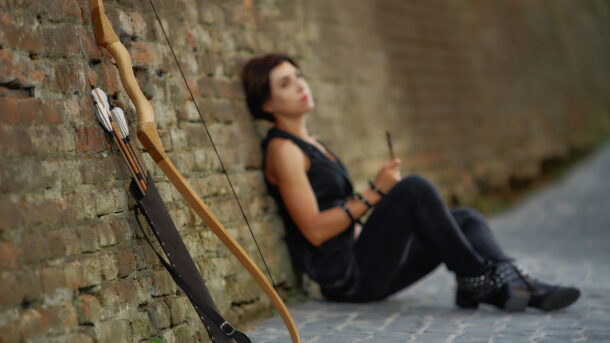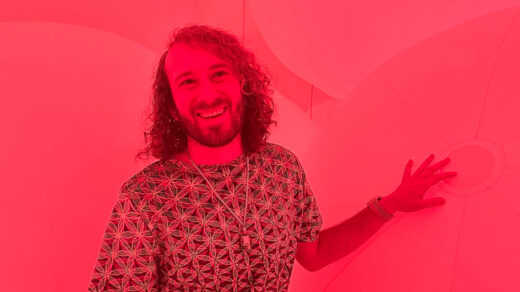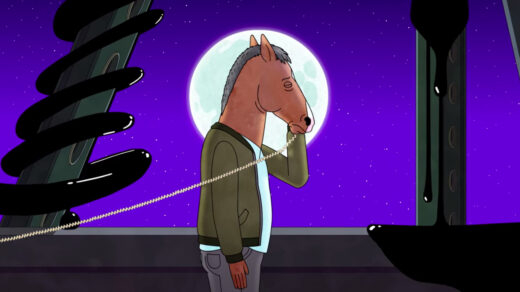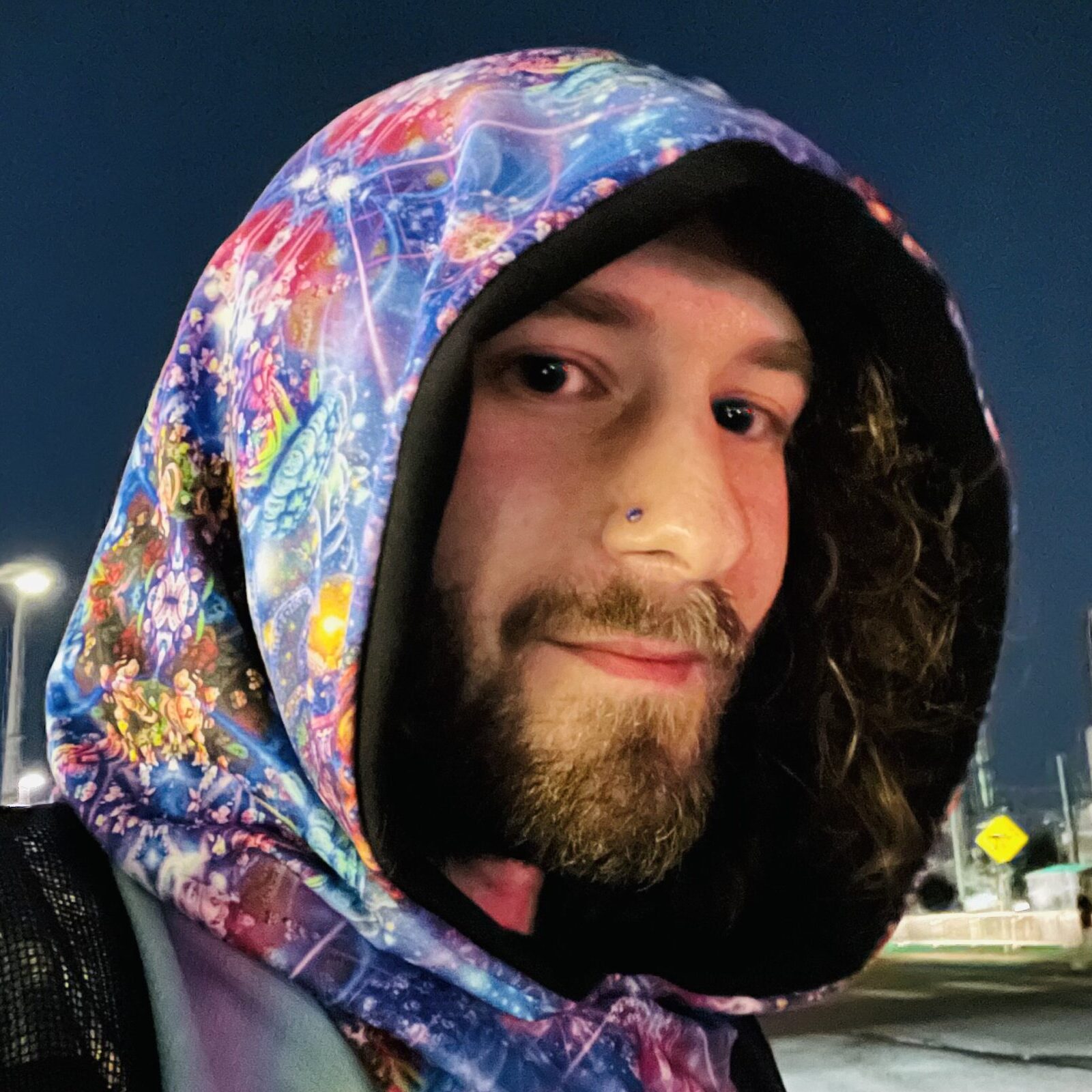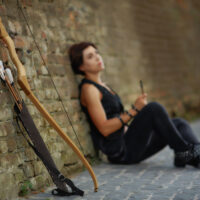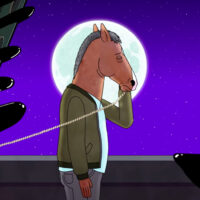Content warning: mental health
A few years ago, my mom taught me about the first and second arrows in Buddhism. The first arrow refers to our reaction to a painful event. Perhaps our partner forgot about the dinner reservations we made for tonight, and we feel disappointed and sad. The second arrow is our reaction to the first arrow: In the given example, we may text something nasty or passive-aggressive to our partner as we sit alone at the restaurant. The first arrow is due to events outside our control, but what about the second? In the parable where the Buddha explains the concept of these arrows, he goes on to say,
In life, we cannot always control the first arrow. However, the second arrow is our reaction to the first. And with this second arrow comes the possibility of choice.
I attended an all-day, outdoor music festival in April with some close friends who invited me, including my friend Branden. I’m very into the visuals at shows, and I generally bring a pair of diffraction glasses with me. (No sponsor – here’s an explanation from the brand I own if you’re unfamiliar or would like to get your own.) There are visuals that pair well with diffraction effects and others that don’t. When the visuals do pair well, I share my glasses with others in my group so I can share my experience. I feel connected and excited when I get to share my experience with others. Anytime I’m with Branden, I assume I will share with him; Branden loves diffraction effects.
At some point in the evening, Branden handed my glasses back to me folded up. I asked if Branden could avoid moving the arms/temples of the glasses because one of the screws was a little loose and I didn’t want it to fall out. I said it wasn’t a big deal and that I would tighten the screw when I got home. Branden was understanding and apologized in advance if he forgot to do so later with all the excitement of the festival. I told Branden it was no big deal: the glasses were $15, and I could always order new ones if something happened. Branden is always exceptionally kind to me and insisted that they were something I owned and he wanted to respect my property – even if they were $15 of mass-produced plastic.
About an hour before the festival ended, I needed to go to the bathroom. The bathroom was on the other side of the festival grounds, so I knew I’d be away from the dance floor for 5-10 minutes or so. I asked Branden if he wanted to use my diffraction glasses while I was in the bathroom, which he excitedly accepted, reiterating something about respecting my property.
When I returned from the bathroom, it took me a few minutes to find my group of friends. It was 9pm at this point, and the dance floor was dark against the light of the show. After a few minutes of searching, I bumped into Branden and noticed he didn’t have my glasses on. I asked Branden if he still had them, and I saw it in his eyes as the realization dawned on him: He didn’t know where the glasses were. He searched his pockets, his brother’s backpack, anywhere he could have put them. He voiced that he may have let another person use the glasses, and he glanced around to see if anyone around us was wearing them. I asked him, “I gave them to you, right?” I knew this was true when I asked. What I was really trying to say was, “I gave these to you, and you said you’d be responsible for them, right?” I was trying to remind him that he had lost my stuff. I asked where they were, and Branden told me he didn’t know. I felt angry.
When Branden gave up his search, he turned to me and apologized. He explained he gets excited at shows and wants to share the experience with others. He gets excited about meeting new people and connecting with them. Branden explained he must have met someone, excitedly shared the glasses with them, and then forgotten who they were – perhaps the person walked away without realizing it. Branden explained that losing things is not new for him, and he felt really guilty about it. And, of course, Branden offered to replace them. He told me he didn’t know where the glasses were, and he was sorry.
I wanted to ask him again, “Where are they?” or “What do you mean, you don’t know where they are?”, but would that return the glasses to me? Would that somehow change what had happened? Would the person who had the glasses hear me and walk over saying, “I’m so sorry, I didn’t mean to take these. Please have them back”? I wanted, somehow, for Branden to know where the glasses were. I knew that if I asked again, I would get the same response. I didn’t think asking again would provide me more information. I realized I wanted to ask him again so he would feel guilt and shame. And I realized that was not the way I wanted to treat my friend. While thinking this to myself, Branden was expressing his feelings to me. In this moment, all I could think to say to Branden was, “Where are they?” for all the reasons I just explained. So instead, I asked Branden if I could have a minute to myself to think. And I did some parts work while I shuffled on the dance floor.
I knew a few logical things, but logic is not how I process trauma. I knew the time was approaching 9:30pm, and the festival ended at 10. So I already got to use the glasses up to the last half hour of the show. Was the last 1/2 hour so much more important than the preceding 6 1/2 hours that missing the glasses ruined the whole festival for me? I knew I also get excited about meeting people, get excited about sharing my experiences with others, and have a tendency to lose track of objects in my excitement – just like Branden. I knew the glasses were $15 and would show up well before my next show if I ordered them when I got home. I knew that, just a few hours prior, I told Branden the glasses weren’t important to me and were just $15. Knowing that statement came from me and represented the kind of person I try to be, I was suspicious I was dealing with The Illness. I knew I was raised to treat people poorly when my objects were at risk, and I knew I didn’t agree with that.
Now that I was alone with my thoughts, though, I could feel what I needed. I needed to feel upset because my glasses were gone. I was feeling disappointed I couldn’t use them for the last half hour. I was feeling sad that my friend had said all those things about respecting my stuff and me, and he still lost my glasses. I thought to myself, “So was all of that bullshit? Was everything Branden said about respecting my stuff and me lies?” I held space for this part. I let this part feel sad, angry, and disappointed. I let it tell its story of betrayal. I let it feel all the feelings I was starting to notice when I wanted to ask Branden where the glasses were after he had already told me he didn’t know. For me, a C-PTSD episode often feels like I’m in a fog of emotion and cannot decipher my feelings or needs. By holding space for my parts, I was able to see through the fog, revealing a memory.
I didn’t receive a lot of patience from my dad when I lost things, especially when I lost something he was looking for at the time. I lost pens, charging cables, pieces of paper, etc., and he would lose his mind. It was like the world was about to come crashing down because I misplaced the generic blue BIC pen he expected to find in a drawer that day. He was awful to everyone in my family when things went missing. As an adult, I can find difficulty forgiving myself for losing things, even tiny things like misplacing my vitamin D capsule in the morning. I find it interesting that the scene my brain played out next was not one of these events.
I remembered an evening when I was 13. I was out to dinner with my family, and we had my dad’s laptop with us. After parking the car, I slid the laptop under the seat in front of me before getting out. I was taught to always hide valuables if they’re staying in the car; otherwise, the car could be an easy target for petty theft. My dad drilled this practice into me from an early age. When we returned to the car, I recovered the laptop from under the seat and fastened my seatbelt. When my dad turned around and saw the laptop sitting on my lap, he accused me of leaving the laptop on the seat during dinner. I don’t know where he got this idea. I don’t understand why he thought I hadn’t hidden the laptop. I tried to explain that I had, in fact, hidden the laptop, but he told me I was lying. This quickly escalated into a scene with me trying to walk away from the car and my dad screaming at me in the middle of the road that I was a liar.
In that moment on the dance floor, I realized I didn’t feel like a person all those years ago with the laptop. I did what I understood I was supposed to do: I hid the laptop. Then I was accused of lying about doing so and screamed at in public. My dad didn’t treat me like a person. As a 13-year-old, I felt small and invisible. I was taught to question how I recalled my memories and the actions I took. I felt like nothing I did or experienced was valid. This man controlled my livelihood, my home, where I lived, what school I went to, who I could see and when – and he was insisting I was a liar and was intentionally trying to deceive him when I wasn’t.
And then I felt sad. I felt regret. I realized: Had I done the same thing to Branden? I wanted him to feel pain because I felt pain. I wanted him to feel guilt and shame. When I asked, “I gave them to you, right?”, and I knew there was more behind the question, was I trying to hurt him the way my dad hurt me?
This realization – it took over. None of that other bullshit was important now. The glasses didn’t matter. What mattered was how Branden felt. I know what it is to not feel like a person. I do not want to hurt anyone like that, especially my friends. The most important thing to me in that moment was to help Branden feel like a person.
I tapped Branden on the shoulder, we embraced in a hug, and I said in his ear, “I don’t care. I love you, and I forgive you.” Branden apologized again and offered to buy me new glasses. Again, I said, “I don’t care. I love you, and I forgive you.”
Branden looked me in the eyes and said, “Thank you, I appreciate your authenticity.” As we started dancing again, I thought, “Is this the second arrow Mom told me about?” I felt the lightness in my body as if I had laid down a bow.
And then something serendipitous happened.
As we were dancing, Branden continued to socialize with new friends as he does. As he moved up ahead and starting talking to people in front of us, I noticed he was especially interested in someone a few feet ahead of me, though I could only see their back. And then I saw the person hand a pair of glasses to Branden, and Branden turn to me with a giant smile. It seems Branden had let someone else use the glasses, but that person was ahead of us, so we couldn’t see their face (and therefore the glasses) when searching. They returned the glasses to us and asked if they could buy the glasses because they were so into the diffraction effects! I gave them the website so they could pick out whichever style and type they wanted.
The universe is a big, random place. I won’t always get my glasses back. When this experience with Branden happened, I thought about my childhood. I thought about how us kids would make a mistake at a party or an event, and my dad would communicate, “You’ve ruined this. Let’s go home.” I wonder how life could’ve been different if he had left himself open to the randomness of life. I wonder how my life can be different if I allow myself to be more open to the randomness.
When I got home that night, I suddenly had the urge to buy Branden some diffraction glasses of his own. And then I remembered how I first discovered diffraction glasses: a paper sample someone handed me at a show. If you’re unfamiliar, think of them like those paper 3D glasses, but they’re for diffracting light. I thought, “This is perfect. He wants to share the experience? I can get him a stack of shared experiences!” I ordered him a plastic pair like mine and 10 paper pairs to hand out to whomever he wanted. I saw Branden at a show two weeks ago, and I think he had handed out the paper ones within 30 minutes of it starting. I fully expect I will share my glasses with him at future shows, and I look forward to it.


